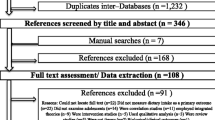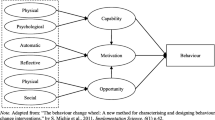Abstract
Introduction: Objectives
The purpose of this study was to examine psychosocial mediators between socioeconomic status (SES) and eating habits in older Japanese adults.
Subjects and methods
A questionnaire was mailed to a representative sample of people who were 60 years and older (N=1,000) living in a suburban area within the Tokyo city metropolitan limits, in Japan. There were 552 effective participants in the study.
Design
Dietary habits were evaluated by assessing the diversity of food that was consumed. SES was evaluated by educational attainment and household income. Four dimensions of psychosocial mediators were assessed: control expectancy, self-efficacy, social influence, and social support. Indirect effects of SES through the mediators were evaluated by using a multiple mediator model.
Results
The relationship between education and dietary habits was mediated by three variables excluding social support. Especially, social influence had the strongest mediating effect. These three significant variables explained the majority of differences in dietary habits resulting from education. The effects of household income were also similarly mediated by the identical variables.
Conclusion
Control expectancy, self-efficacy, and social influence mediate the relationship between SES and dietary habits.
Similar content being viewed by others
References
Marmot MG. Epidemiology of socioeconomic status and health: are determinants within countries the same as between countries? Ann NY Acad Sci 1999;986: 16–29
Adler NE, Ostrove JM. Socioeconomic status and health: what we know and what we don’t. Ann NY Acad Sci 1999;896: 3–15
Robert SA, House JS. Socioeconomic inequalities in health: integrating individual, community, and societal-level theory and research. In: Albrecht GL, Fitzpatrick R, Scrimshaw SC (eds) The handbook of social studies in health and medicine, Sage Publication, London. 2000;pp.115–135
Gwatkin DR, Rutstein S, Johnson K, Suliman E, Wagstaff A, Amouzou A (2007) Socio-economic differences in health, nutrition, and population within developing countries: an overview. The World Bank, Washington, DC. http://siteresources.worldbank.org/INTPAH/Resources/IndicatorsOverview.pdf. Accessed 6 March 2013
Herd P, Robert SA, House JA. Health disparities among older adults: life course influences and policy solutions. In: Binstock RH, George LK (Eds) Handbook of Aging and the Social Sciences, 7th edn. Academic Press, San Diego, CA, 2011;pp 121–134.
De Irala-Estevez J, Groth M. A systematic review of socioeconomic differences in food habits in Europe: consumption of fruit and vegetables. Eur J Clin Nutr 2000;54:706–714
Vlismas K, Stavrinos V, Panaquiotakos DB. Socio-economic status, dietary habits and health-related outcomes in various parts of the world: a review. Cent Eur J Public Health 2009;17(2):55–63
Raffensperger S, Kuczmarski MF, Hotchkiss L, Cotugna N, Evans MK, Zonderman AB. Effect of race and predictors of socioeconomic status on diet quality in the HANDLS Study sample. J Natl Me Assoc 2010;102:923–930
Houston DK, Johnson MA, Poon LW, Clayton GM. Individual food and food group patterns of the oldest old. J Nutr Elder 1994;13(4):5–23
Guthrie JF, Lin BH. Overview of the diets of lower- and higher-income elderly and their food assistance options. J Nutr Educ Behav 2002;34:S31–S41
Jensen RT. Socioeconomic status, nutrition, and health among the elderly. In: Wise DA (Ed) Perspectives on the Economics of Aging. University of Chicago, Chicago, IL, 2004;pp313–331
Bamia C, Orfanos P, Ferrai P et al. Dietary patterns among older Europeans: the EPIC-Elderly study. Br J Nutr 2005;94:100–113
Robinson S, Syddall H, Jameson K et al. Current patterns of diet in communitydwelling older men and women: results from the Hertfordshire Cohort Study. Age Aging 2009;38:594–599
Katsarou A, Tyrovolas S, Psaltopoulou T et al. Socio-economic status, place of residence and dietary habits among the elderly: the Mediterranean islands study. Public Health Nutr http://www.ncbi.nlm.nih.gov/pubmed/2035361613(10):1614-21
Dijkstra SCl, Neter JE, Brouwer IA et al. Adherence to dietary guideline for fruit, vegetables and fish among older Dutch adults; the role of education, income and job prestage. J Nutr Health Aging 2010;18(2):115–21
James WPT, Nelson M, Ralph A, Leather S. Socioeconomic determinants of health: The contribution of nutrition to inequalities in health. Br Med J 1997;314:1545–1549
Smith GD, Brunner E. Socio-economic differentials in health: the role of nutrition. Proc Nutr Soc 1997;56:75–90
Dollman J, Ridley K, Magarey A, Martin M, Hemphill E. Dietary intake, physical activity and TV viewing as mediators of the association of socioeconomic status with body composition: a cross-sectional analysis of Australian youth. Int J Obes 2007;31:45–52
Panagiotakos DB, Pitsavos C, Chrysohoou C et al. Dietary habits mediate the relationship between socio-economic status and CVD factors among healthy adults: the ATTICA study. Public Health Nutr 2008;11(12):1342–1349
Goodwin JS, Leonard AG, Hooper EM, Garry PJ. Concern about cholesterol and its association with diet in a group of healthy elderly. Nutr Res 1985;5:141–148
Thomas SE, Kendrick OW, Eddy JM. Modification of a nutrition questionnaire for older adults and the ability of its knowledge and attitude evaluations to predict dietary adequacy. J Nutr Elder 1990;9(4):35–63
Howard JH, Gates GE, Ellersieck MR, Dowdy RP. Investigating relationships between nutritional knowledge, attitudes, and belief and dietary adequacy of the elderly. J Nutr Elder 1998;17(4):35–52
Lahmann PH, Kumanyika SK. Attitudes about health and nutrition are more indicative of dietary quality in 50- to 75-year-old women than weight and appearance concerns. J Am Diet Assoc 1999;99(4):475–78
Parmenter K, Waller J, Wardle J. Demographic variation in nutrition knowledge in England. Health Educ Res 2000;15:163–174
Ball K, MacFarlane A, Crawford D, Savige G, Andrianopoulos N, Worsley A. Can social cognitive theory constructs explain socio-economic variations in adolescent eating behaviors? A mediation analysis. Health Edu Res 2009;24(3):496–506
Leganger A, Kraft P. Control constructs: do they mediate the relation between education al attainment and health behavior? J Health Psychol 2003;8:361–372
Turrell G, Kavanagh AM. Socio-economic pathways to diet: modeling the association between socio-economic position and food purchasing behavior. Public Health Nutr 2005;9:375–383
Moore GF, Tapper K, Lynch R et al. Associations between deprivation, attitudes towards eating breakfast and breakfast eating behaviors in 9-11-year-olds. Public Health Nutr 2007;10(6): 582–589
Beydoun MA, Wang Y. How do socio-economic status, perceived economic barriers and nutrition benefits affect quality of dietary intake among US adults? Euro J Clin Nutr 2008;62:303–313
Steptoe A, Wardle J. Motivational factors as mediators of socioeconomic variations in dietary intake patterns. Psychol Health 1999;14(3):391–402
Hupkens C, Knibbe R, Drop M. Social class differences in food consumption: the explanatory value of permissiveness and health and cost consideration. Eur J Public Health 2000;10:108–113
Lindstrom M, Hanson BS, Wirfalt E, Ostergren PO. Socioeconomic differences in the consumption of vegetables, fruits and fruit juices. Eur J Public Health 2011;11(1):51–59
Heaney CA, Israel BA. Social networks and social support. In: Glanz K, Rimer BK, Lewis FM (Eds) Health Behavior and Health Education: Theory, Research, and Practice, 3rd edn. Jossey-Bass, San Francisco, CA, 2002;pp185–209
House JS. Understanding social factors and inequalities in health: 20th century progress and 21st century prospects. J Health Soc Behav 2002;43:125–142
Bandura A. Self-efficacy: the exercise of control. Freeman and Company, New York,WH, 1997
Bandura A. Self-efficacy: toward a unifying theory of behavioral change. Psychol Rev 1977;84:191–215
Baranowski T, Perry CL, Parcel GS. How individuals, environment, and health behavior interact. In: Glanz K, Rimer BK, Lewis FM (Eds) Health Behavior and Health Education Theory, Research, and Practice, 3rd ed. Jossey-Bass, San Francisco, CA, 2002;pp 165–184
Toner HM, Morris JD. A social-psychological perspective of dietary quality in later adulthood. J Nutr Elder 1992;11(4):35–53
Van Duyn M, Kristal A, Dodd K et al. Association of awareness, intrapersonal and interpersonal factors, and stage of dietary change with fruit and vegetable consumption: a national survey. Am J Heath Promot 2000;16(2):69–78
Inglis V, Ball K, Crawford D. Why do women of low socioeconomic status have poorer dietary behaviors than women of higher socioeconomic status? A qualitative exploration. Appetite 2005;45:334–343
Grundy E, Holt G. The socioeconomic status older adults: How should we measure it in studies of health inequalities? J Epidemiol Community Health 2001;55:895–904
Statistical Bureau, Ministry of Internal Affairs and Communications, Historical data 3 in Labour Force Survey. http://www.stat.go.jp/data/roudou/longtime/03roudou.htm. Accessed 19 April 2014 (in Japanese)
Kumagai S, Watanabe S, Shibata H et al. Effects of dietary variety on declines in high-level functional capacity in elderly people living in a community. Japanese Journal of Public Health 2003;50(12):1117–1124
Kant AK. Dietary patterns and health outcomes. J Am Diet Assoc 2004;104:615–635
Muthén, Muthén. Mplus User’s guide Los Angels, CA, 2007
Preacher KJ, Hayes AJ. Asymptotic and resampling strategies for assessing and comparing indirect effects in multiple mediator models. Behav Res Methods 2008;40(3):879–891
Yamazaki S, Fukuhara S, Suzukamo Y. Household income is strongly associated with health-related quality of life among Japanese men but not women. Public Health 2005;119:561–567
Committee Report of Japanese Society of Public Health. Monitoring and report of public health. Japanese Journal of Public Health 2011;58:564–568 (in Japanese)
Kobayashi J. Social stratification and food: analyses of effects on health. Sociological Theory and Methods 2010;25(1): 81–93 (in Japanese).
Cancer Control and Health Promotion Division, Health Service Bureau, Ministry of Health, Labour and Welfare, 2013 The National Health and Nutrition Survey. http://www.mhlw.go.jp/stf/houdou/2r9852000002q1st-att/2r9852000002q1wo.pdf. Accessed 6 March 2014 (in Japanese)
Lindstrom M, Hanson BS, Brunner E et al. Socioeconomic differences in fat intake in a middle-aged population: report from the Malimo Diet and Cancer Study. Int J Epidemiol 2000;29:438–448
Murray TC, Rodgers WM, Fraser SN. Exploring the relationship between socioeconomic status, control beliefs and exercise behavior: a multiple mediator model. J Behav Med 2012;35:63–73
Ball K., Crawford D, Mishra G. Socio-economic inequalities in women’s fruit and vegetable intakes: a multilevel study of individual, social and environmental mediators. Public Health Nutr 2006;9(5): 623–630
Sandersphillips K. Correlates of healthy eating habits in low-income Black women and Latinas. Prev Med 1994;23(6):781–787
Watters J, Satia JA, Galanko JA. Associations of psychosocial factors with fruits and vegetable intake among African-Americans. Public Health Nutr 2007;10(7): 701–711
Kelsey KS, Kirkley BG, DeVellis RF et al. Social support as a predictor of dietary changes in a low-income population. Health Educ Res 1996;11(3):383–395
Sorensen G, Stoddard A, Macario E. Social support and readiness to make dietary changes. Health Educ Behav 1998;25(5):586–598
Fowles ER, Bryant M, Kim S. Predictors of dietary quality in low-income pregnant women: a path analysis. Nurs Res 2011;60:286–294.
Green KE. Sociodemographic factors and mail survey response. Psychol Market 1996;13(2):171–184.
Hox JJ, De Leeuw ED. A comparison of nonrespondense in mail, telephone and faceface surveys. Qual and Quant 1994;28:329–344
Morland K, Wing S, Diez Roux A. The context effect of the local food environment on residents’ diets: the atherosclerosis risk in communities study. Am J Public health 2002;92:1761–1767.
Cohen JL, Lakey B, Tiell K, Neeley LC. Recipient-provider agreement on enacted support, perceived support, and provider personality. Psychol Assessment 2005;17:375–378
Vollmann M, Antoniw K, Hartung FM, Renner B. Social support as mediators of the stress buffering effect of optimism: the importance of differentiating the recipients’ and providers’ perspective. Eur J Pers 2011;25:146–154.
Author information
Authors and Affiliations
Corresponding author
Rights and permissions
About this article
Cite this article
Sugisawa, H., Nomura, T. & Tomonaga, M. Psychosocial mediators between socioeconomic status and dietary habits among Japanese older adults. J Nutr Health Aging 19, 130–136 (2015). https://doi.org/10.1007/s12603-014-0521-5
Received:
Accepted:
Published:
Issue Date:
DOI: https://doi.org/10.1007/s12603-014-0521-5




